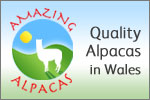Articles by Alpaca World Magazine:
Letter from Spain
Nigel & Ginny Cobb
The excitement is building here in Spain as we eagerly await the arrival of twenty one alpacas from the UK, if the export restrictions for FMD and BTV are ever lifted!
Arish and Sue Turle of Alham Valley Alpacas have kindly agreed to invest in our business over here, by providing nineteen animals, most of which are pregnant to some of the best studs available in the UK. Their generosity is overwhelming and their belief of what we are doing here is encouraging to say the least. We already have buyers for two of their breeding females and more interest all the time; long may it last.
The consequence of this opportunity is that we will have to move house, as we need more land; by this time next year our herd will have grown from 19 to about 65. We have buyers for our finca who are willing to wait till we can re-locate, thank goodness. But we are having problems finding something suitable. The hunt is on-going and no doubt this will mean another large building project is on the cards.
We are expecting some 30 births, spread throughout the year unfortunately, for all sorts of circumstances, too numerous to mention here, with no respite other than December 2008. Alpaca hell! Plus the first births for a couple of our clients as well. Ginny has birthed a flock of 100 ewes with great success and of course alpacas for the last four years, not in this quantity though. Let?s face it, there is no comparison between the potential value of an alpaca cria and a lamb. This will put a lot of additional strain on the situation as this is our livelihood and we strive to give them the very best care at all times. Wish us luck, please.
It is the goat birthing season here now and we have already secured our supply of ?liquid gold?, in the form of goats? colostrum. Since being here we have found it invaluable, when necessary. Blood will be taken shortly from our boys and spun locally in Ronda. The plasma will join the colostrum in the freezer. Having everything necessary at hand before the event is a must. Just in case.
Alpacas de Andalucia had a remarkable day last month when a group of 20 single parents and their children came to visit. As luck would have it on the chosen day it rained cats and dogs, so we postponed the visit till later in the week. We had a great afternoon, introducing them to Max, Martin, Bonita, Lulu and the star of the show Zac and gave a little educational stuff as well. The children, aged between two and twelve behaved impeccably and the alpacas did their bit. Ella was too interested in her public to take much notice of where her feet were going and fell in the swimming pool, shallow-end, thank goodness, and broke a toe nail. All is well and she now has no more public engagements until her cria is born in the Spring. We received good local press coverage for the event and as all the visitors live in the UK, we are doing our bit for the home industry. Ian & Elaine Love proprietors of Hotel Molino del Puente www.hotelmolinodelpuente.com, whose idea it was, are going to promote similar events for their guests in the future. Every bit of publicity creates awareness of what we are doing.
In Estepona, on the Costa del Sol we attended the Over 50?s exhibition. We were actually promoting Nigel?s business of writing English and Spanish wills, but we gave over half the stand to our alpacas. To be honest we had not expected much in the way of real interest ? lots of ?what are they??, but nothing serious. It could not have been further from the truth. In fact we now have four serious potential buyers, a spinner who thinks alpaca fleece is amazing and other people wanting to come and see the farm. It just shows you that publicity, where ever you can get it, may bring results. We are following up these leads and hope that it will create new owners in this part of the world.
The current disease situation is causing us all concern and one wonders if the market will ever be the same. Certainly there will be more conditions on the movement of alpacas and with this in mind we are trying to get an initiative across Europe for a level playing field. In our minds we need to get the National associations working together to resolve the issues of disease control and prevention for camelids. There are too many differences across the various countries. This may seem unimportant to the UK owner, but as Nick Harrington-Smith pointed out in the last issue of Alpaca World the UK needs the rest of Europe as its market place. Doing nothing and adopting the UK mentality of ?rowing our own boat? could prevent such trade. Just look at the regulations last year regarding showing our animals in the French shows. Be warned!
The issue for us all to consider is that we now have a certainty in that Blue Tongue is here to stay. The serotypes may change, but we know that alpacas are susceptible to the disease, though we do not yet have firm evidence to say that they die from it. Whether they should be vaccinated against this disease is not something we are qualified to comment on, but surely we must research any vaccine before we go into a programme for the European stock. We are sure that Claire Whitehead has this in hand, as she sits on the relevant DEFRA committee, on behalf of camelid owners. We suggest that funds should be made available from the Camelid Trust urgently to research this issue, in conjunction with DEFRA and a university. There are owners who would be prepared to donate some animals for this research.
There is another issue that we should be taking more seriously. We have seen the consequence of poor bio-security with FMD spreading from a research establishment. That?s not our fault, we hear you say. But many of us have little idea about bio-security at our own farms and if we are to be serious about our investment in these animals, then we need to lead the way and ensure we have proper controls and systems in place to combat and prevent disease in the future. We would suggest that the BAS works with the British Veterinary Camelid Society (BVCS) and creates a bio-security regime for all alpaca owners. Maybe we could also centralise our findings on animal diseases and deaths, so that we can build up a better picture to help protect them in the future.
This is all rather depressing, we know, but the trouble is that we are all living with these issues now. It will be quite likely that Blue Tongue could affect the show programme and our marketing activities next year. We hope we are not being too gloomy in saying that this may well be the beginning of the end for the industry as we know it, unless we can collectively act together. But a simple request to the Camelid Trust bought me down to earth, when Nick Weber said that this issue had to be agreed not by two societies, as in the past, but now three. That is not what we thought when we merged the two organisations. Then there is the rest of Europe to get to agree to a programme.
Put in a nutshell; think of the consequences for drive-by matings etc if blood tests and quarantine periods are introduced. What happens then?
We suggest that the Societies across Europe appoint a pan-European committee to meet and discuss these issues. Let us all work together on issues that affect us all.
We would welcome comments on our thoughts. Please do let us know what you feel.
www.alpacasdeandalucia.com
Nigel.cobb@andaluciaalpacas.com
Tweet



